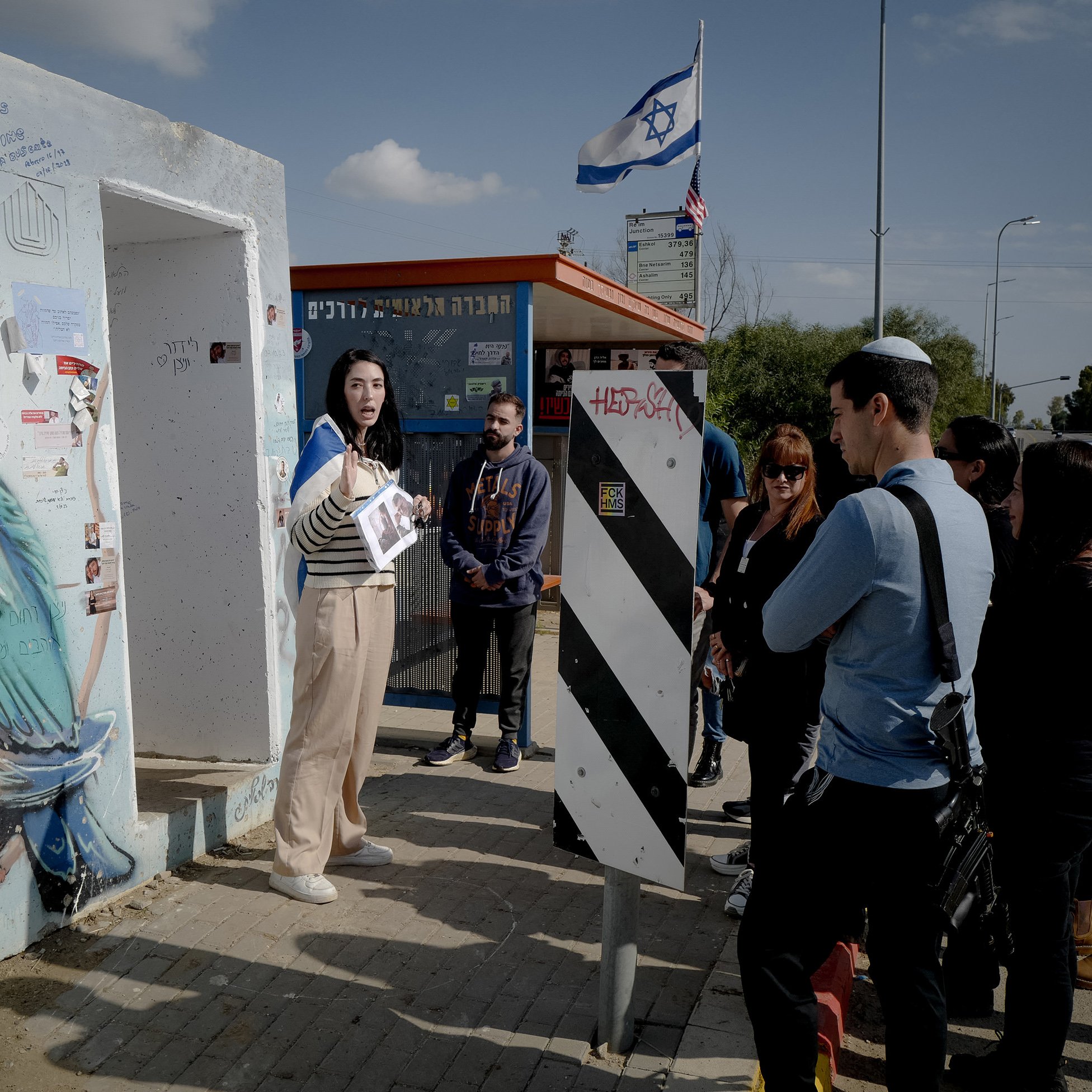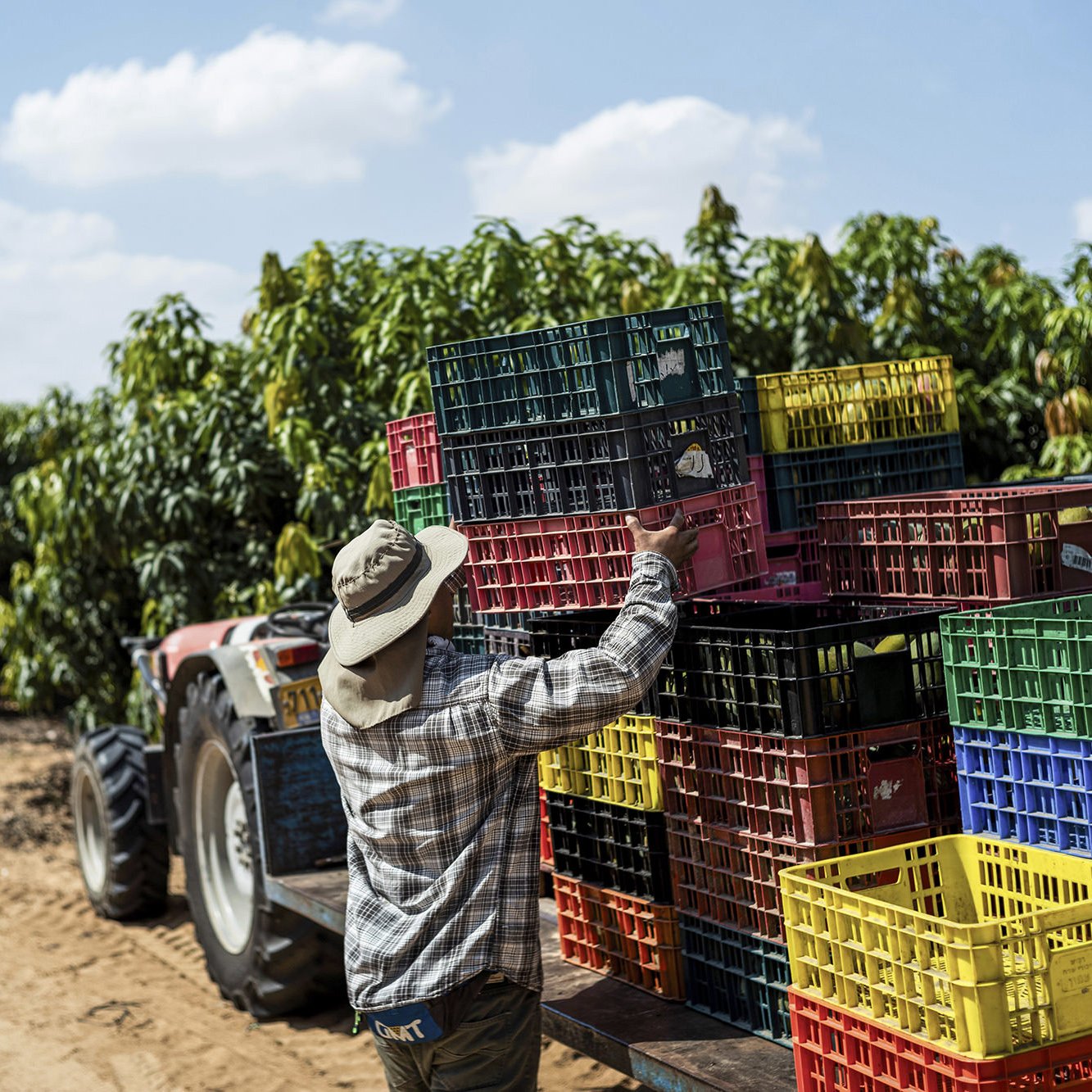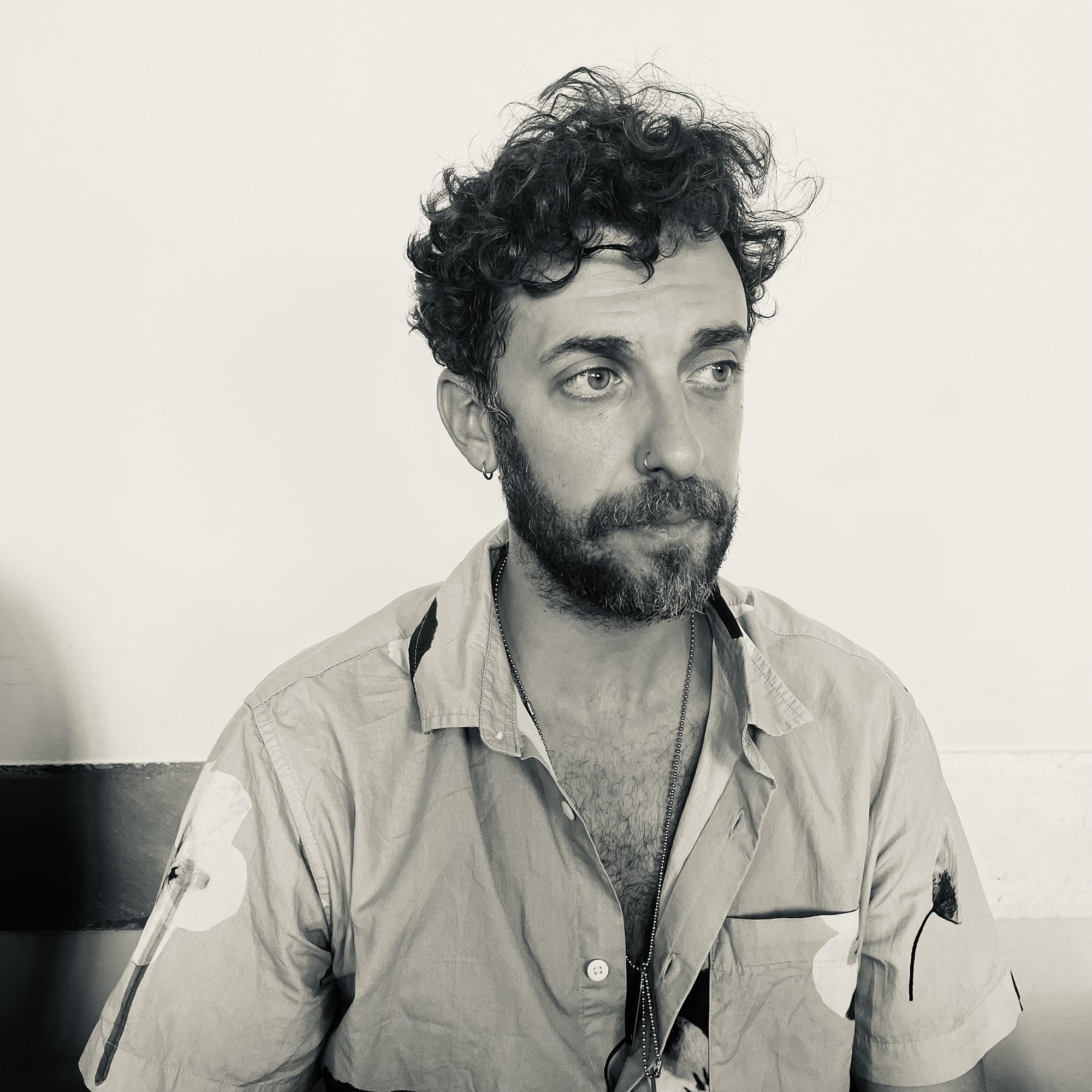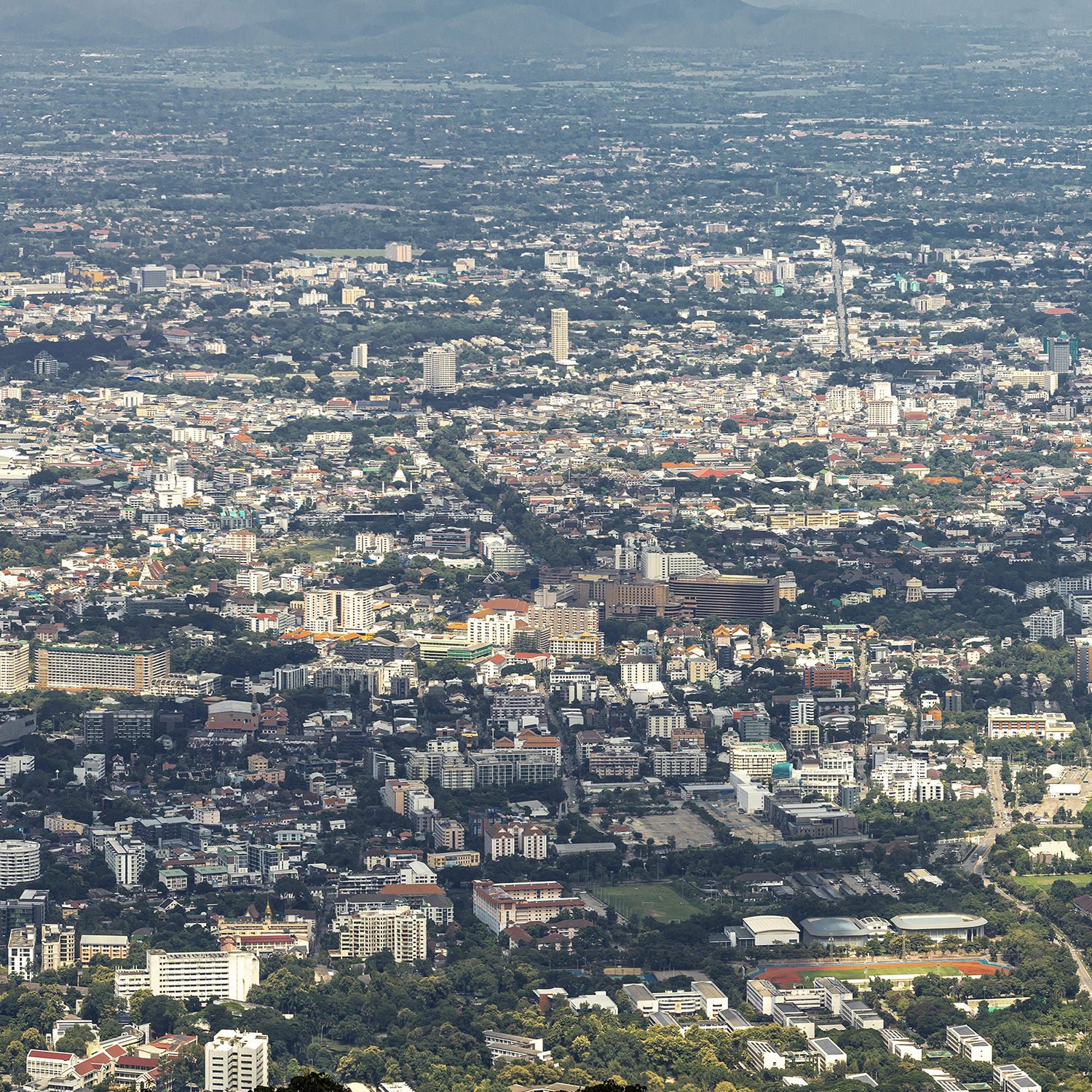Thailand’s “Land of Checkpoints”
In Bangkok, the Israel-Hamas War threatens to curdle domestic tensions.
JANUARY 11, 2024
State of the World features occasional dispatches on the latest news, events, and ideas. To receive these updates directly in your inbox, sign up for our newsletter.
✺
This week, Kong Rithdee is reporting from Bangkok, Thailand.
12 October 2023, Israel, Sde Nitzan: A Thai worker continues to labour in the fields adjacent to Gaza Strip, despite the ongoing war between Hamas and Israel (Photo by: Ilia Yefimovich/picture-alliance/dpa/AP Images)
Thailand and Israel have had formal diplomatic relations since 1954. In 2012, Thailand also officially recognized the State of Palestine, and in 2016, then-president of Palestine Mahmoud Abbas paid a visit to Thailand. But for the average Thai person, the Middle East, in general, hardly elicits concern.
Hamas’ October 7 offensive changed all that. The death and kidnapping of Thai farm workers put Palestine and Israel firmly in the consciousness of the Thai public. The incident also presented Prime Minister Srettha Thavisin, a former real estate tycoon with no previous experience in public office, with his first critical international crisis.
Before October 7, there were 25,962 Thai workers in Israel, accounting for 19 percent of all Thai workers abroad.
The prime minister focused his attention on evacuating Thai people and negotiating for the release of the kidnapped. After an initial statement, Srettha stopped commenting on the war. Though both Indonesian President Joko Widodo and Malaysian Prime Minister Anwar Ibrahim have repeatedly called for an end to the bombing of Gaza, Srettha has not joined their pleas. Instead, in the weeks following October 7, he narrowed the scope of his public communications to updates on the ongoing search-and-rescue mission for Thai hostages held by Hamas.
Several rounds of negotiation through diplomatic, political and informal channels subsequently resulted in the release of 23 Thai hostages by early December. Thirty-nine Thai citizens have been killed, and eight are still being held captive by Hamas.
✺
Before October 7, there were 25,962 Thai workers in Israel, accounting for 19 percent of all Thai workers abroad, according to data from the Thai Ministry of Labor. Over 90 percent of Thai laborers in Israel work in agriculture, earning four or five times more than what they could from farming at home or in Bangkok (the only country that hosts more Thai workers than Israel is Taiwan). In the immediate aftermath of the October 7 attack, the Thai Embassy in Tel Aviv sent a message to all Thai workers across Israel and urged them to register for repatriation. On X, Prime Minister Srettha wrote: “I’m concerned about the safety of all Thai people in Israel. I urge all of you to come back to Thailand as soon as possible.”
On October 16, the Thai Air Force evacuated 130 workers from Tel Aviv, and Thai Defense Minister Sutin Klungsang met the returnees on the tarmac at Bangkok’s Don Mueang Airport. In the following days, the Thai Air Force conducted several evacuation flights, while thousands of workers also paid for their own trips home on commercial airlines.
“Although the situation remains precarious, I’m willing to go back there when it’s possible,” Nutthawaree Munkarn, 35, told me. She was held hostage by Hamas for over 49 days before she was released, and said she still has nightmares about the experience.
By December, some 9,475 Thai workers had been repatriated, and the government announced that they would all receive a 50,000-baht ($1,430) relief payment for their lost income. But despite the aid and the ongoing war, economic necessity has led a large number of repatriated workers to report that they would like to return to work in Israel as soon as the situation allows. On a Facebook group where over 15,000 Thai workers in Israel share information, several have already posted questions about the procedures to return. Others said that they have already booked flights.
“Although the situation remains precarious, I’m willing to go back there when it’s possible,” Nutthawaree Munkarn, 35, told me. She was held hostage by Hamas for over 49 days before she was released, and said she still has nightmares about the experience. “The memory of the underground tunnel was not something I could shake off easily,” she said. But returning to Israel to work offers a path forward for her to begin to rebuild what she has lost. “I had a dream of settling down in [my hometown] but it’s not possible now because of our debts,” she said. “I lost all my savings in the fire in Israel. So if there’s a chance to work abroad again, I’ll seize it instantly.”
The rush to free Thai hostages required extensive diplomatic shuttling. In October, Thailand’s Foreign Minister Parnpree Bahiddha-Nukara traveled to Qatar to meet with Prime Minister Sheik Mohammed bin Abdulrahman bin Jassim Al Thani, while Srettha met with Saudi Crown Prince Mohammed bin Salman in Riyadh, where he secured the Crown Prince’s promise to exert his influence in the matter. (Thailand and Saudi Arabia restored diplomatic ties only in 2022, after nearly three decades of fallout following a high-profile theft of a Saudi royal jewelry by a Thai butler in 1989, an incident known as the “Blue Diamond Affair”). Srettha also called on Prime Minister Anwar Ibrahim of Malaysia, Thailand’s southern neighbor, for help because of Malaysia’s strong diplomatic relationship with Palestinian leadership. (Malaysia has no diplomatic relations with Israel and has never recognized the Israeli occupation of Palestinian territories.)
Thailand also benefited from the efforts of a group of independent negotiators led by the Thai-Muslim politicians Wan Muhammad Noor Matha and Areepen Uttarasin. Both are Sunni Thai-Muslim with established relationships with Shiite groups in Thailand and abroad, and are respected figures among Iranian officials in Thailand and Tehran. Working with the Thai-Iran Alumni Association, Areepen, a former education minister, managed to arrange a meeting in Tehran with the Hamas negotiator Khaled Qaddoumi. “I told them I’m here not to negotiate but simply to ask them to release [the hostages],” he told Al-Jazeera. It is believed that this two-tiered negotiation strategy contributed to the release of 23 Thai hostages during the brief ceasefire in late November.
✺
The noise on the street tells a more complex story of how the Israel-Hamas war will shape the future of Thailand, a Buddhist country with a sizable Muslim minority.
On October 21, around 300 Thai-Muslims, along with some exiled Palestinians, rallied outside the Israeli Embassy in Bangkok to condemn Israel and the United States for the violence in Gaza and what they saw as an inhumane use of force on an oppressed population. The protest had no clear leader, but several people took turns delivering fiery speeches and repeated the demand to “end the genocide.” Thai police stood guard without intervening, largely permitting the outpouring of anti-Israel and anti-US chants to go on for a few hours before the protesters dispersed.
A large portion of the demonstrators on October 21 came from the Deep South, the predominantly Muslim southernmost region on the Thai border with Malaysia, where sympathy with the Palestinians runs deep. Students and activists have also convened smaller gatherings in the region in solidarity with Gazans.
The rest of the country tends to regard the Deep South and its Malay-speaking inhabitants with mistrust, due to their faith, language, and the longstanding impression of violence associated with news reports coming from the region. News that Hamas had killed Thai workers and taken 32 Thais hostage threatens to curdle that dislike into something stronger and more toxic.
Since 2004, Thailand’s Deep South has been the site of ongoing unrest due to the presence of ethnic separatists in the region. Home to the ethnic Thai-Malay minority, the region has been the site of heavy-handed and at times violent actions from the Thai military since the 2000s. Over the last 20 years, over 7,000 people have been killed in the Deep South. While the majority were killed by insurgent bombs, Thai military actions have contributed to the fatalities. In 2004, the Thai military opened fire on Muslim protestors, killing seven people; 78 others suffocated to death after the military rounded them up and forced them into military transport trucks.
Locals sometimes call the southernmost provinces “the land of checkpoints,” where barbed-wire barricades traverse roads almost at every kilometer and armed soldiers often stop young men to ask for their papers. It is tempting to compare the situation in the region to that of Gaza under Israeli control. Although conditions have somewhat improved in the past few years due to diminished insurgent activity, the region and its Muslim inhabitants still bear the scars of injustice. The checkpoints remain, though military presence has lessened and domestic tourists have begun to return. The rest of the country tends to regard the Deep South and its Malay-speaking inhabitants with mistrust, due to their faith, language, and the longstanding impression of violence associated with news reports coming from the region. News that Hamas had killed Thai workers and taken 32 Thais hostage threatens to curdle that dislike into something stronger and more toxic.
Thailand’s Ministry of Foreign Affairs says it is continuing to pursue all diplomatic routes to secure the release of the remaining hostages despite the resumption of heavy bombing in Gaza. The public mood, however, has shifted from intense concern to occasional interest. The news cycle has already moved on, while reports from Gaza and the climbing civilian death toll is relegated to a sidebar.





